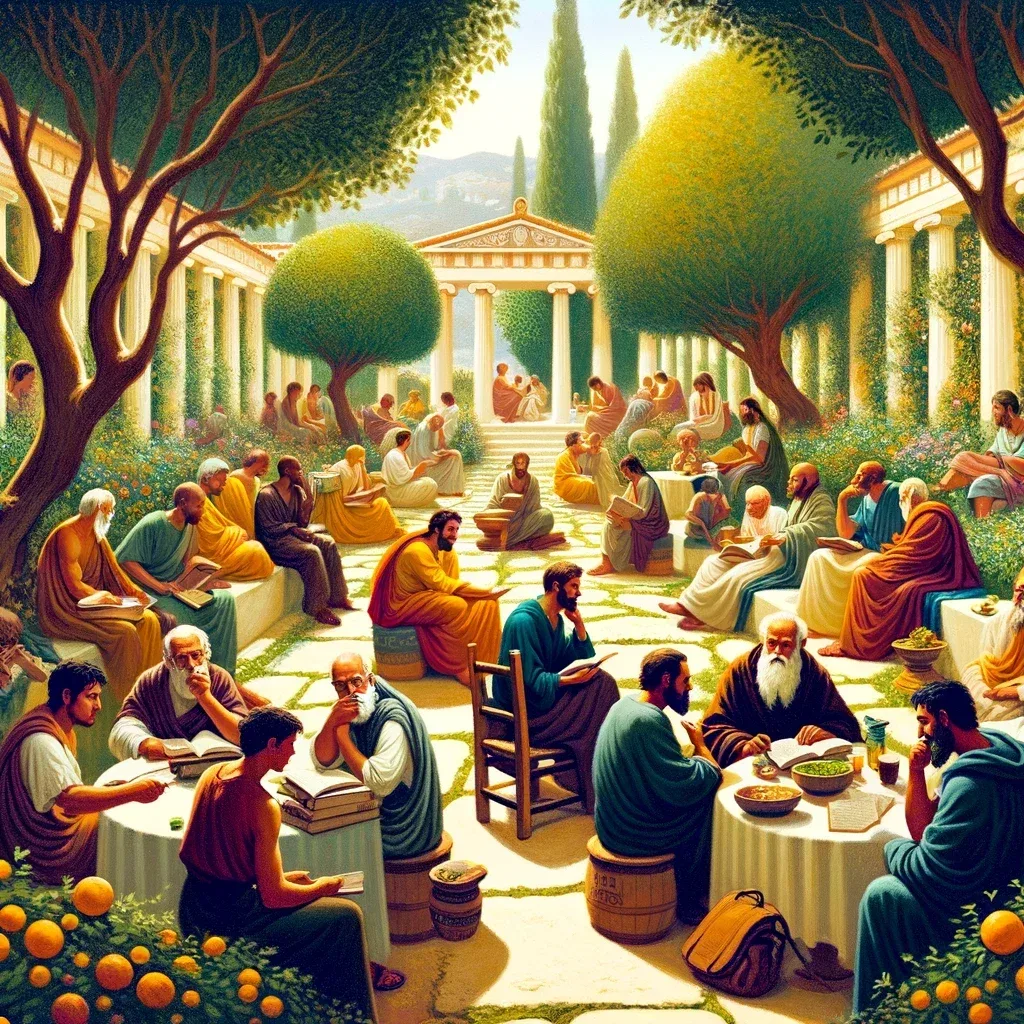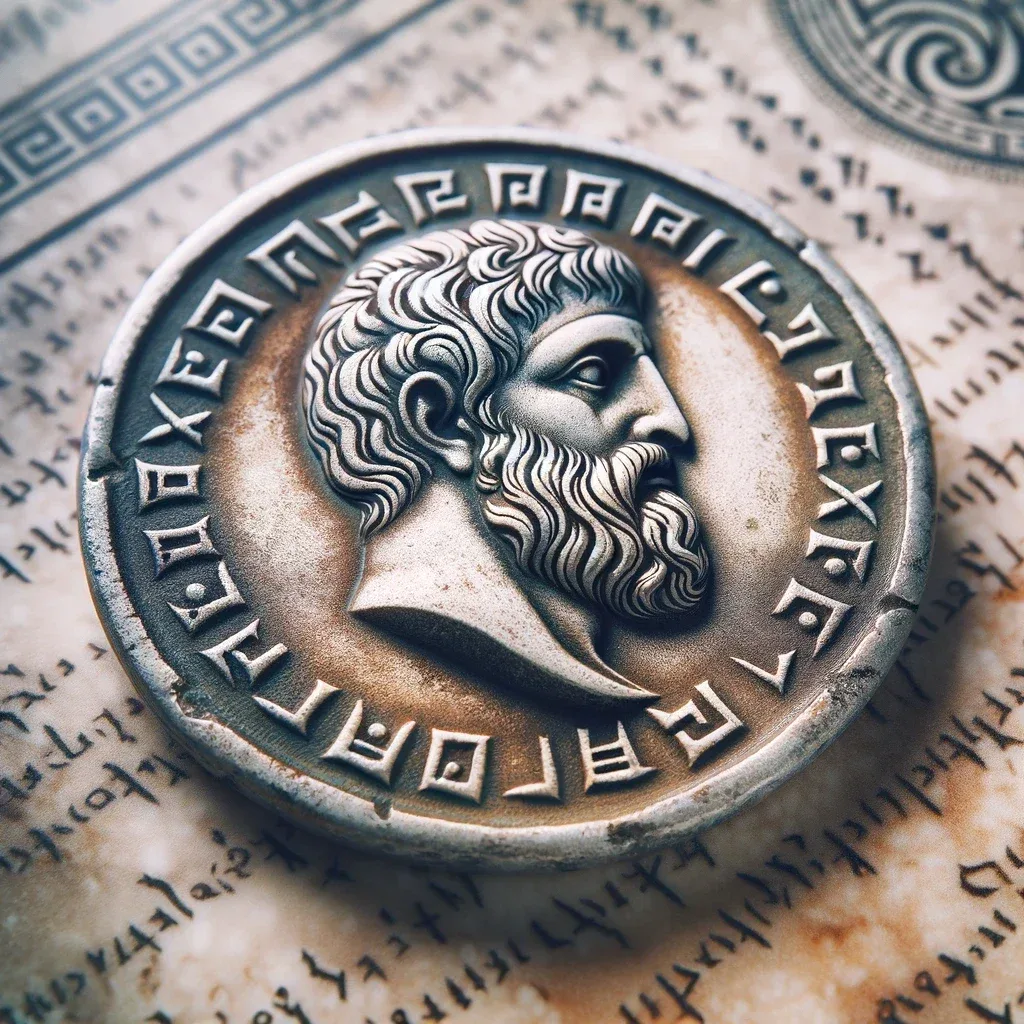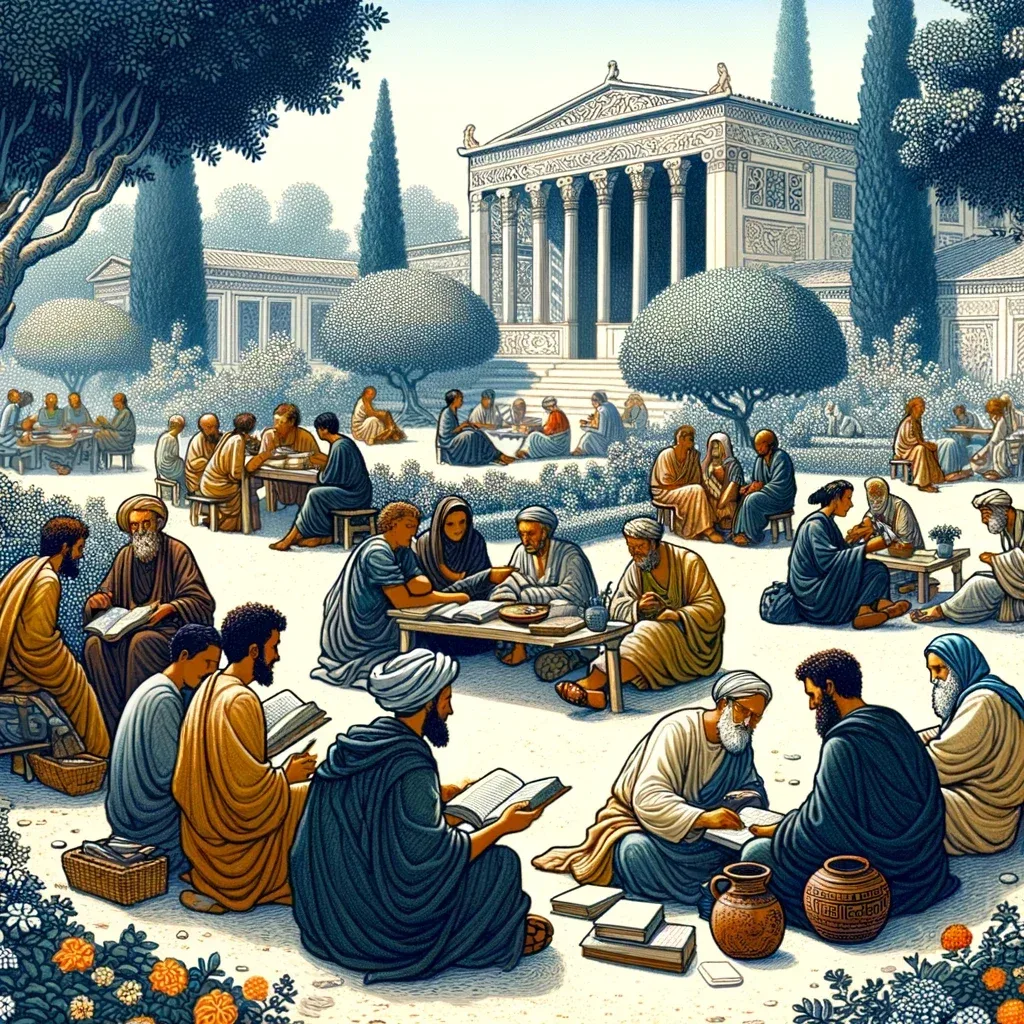Introduction to Epicureanism
Epicureanism is a philosophy that has stood the test of time, taking root in Western culture and thought since its conception in Ancient Greece. Its origins date back to the third century BC, when it was founded by Epicurus of Samos, a philosopher who followed the tradition of thinkers such as Democritus. The essence of Epicureanism lies in pleasure as the main good in life, but, contrary to many misconceptions, it is a moderate pleasure and not unbridled indulgence.

The Historical Context
To understand how Epicureanism emerged, it is crucial to look at the historical context of its founding. Hellenistic Greece was full of uncertainty and change. In this scenario, people sought a philosophical refuge that offered peace and happiness. Epicurus provided this refuge, teaching that true happiness comes from simple pleasures such as friendship, freedom, and analytical thinking.
Epicurus and His Philosophy
Epicurus was not a man of excess; he proposed a life of self-knowledge and intelligent pleasure. His teachings centered on the idea that, by understanding the nature of the world and our place in it, we could achieve ataraxia — a state of serenity and inner peace. He believed that fear and superstition were barriers to happiness and that through knowledge we could overcome them.
The Pillars of Epicureanism
The Pleasure Theory
Epicureanism is often associated with hedonism, but Epicurus's true message was more subtle. He distinguished between pleasures of the body and pleasures of the mind, prioritizing the latter. For Epicurus, the greatest pleasures are those that satisfy natural and necessary needs, such as eating and shelter.
The Nature of the Gods
Epicurus had a unique view of the gods. He argued that although gods exist, they are not interested in human affairs. This vision freed people from the fear of gods and fate, allowing them to live lives focused on personal well-being.
Death is not to be feared
For Epicureans, death is not an event to be feared. Epicurus taught that once we are dead, we do not exist; and if we do not exist, then death is not an experience and therefore not something to be feared.
The School of Epicurus: The Garden

A Philosophical Refuge
Epicurus established his philosophical school in Athens, known as The Garden. It was a community space where followers lived and studied together, practicing the teachings of Epicurus. This community was inclusive, welcoming men and women, free and slaves.
Teachings and Practices
In the Garden, students learned not only about philosophy, but also about science and ethics. Community life served as a laboratory for the practice of living virtuously according to Epicurean principles.
Legacy and Influence
The Garden's legacy endured for centuries after Epicurus' death. The school continued to attract followers and influenced subsequent thinkers, leaving an indelible mark on the history of philosophy.
Epicurean Principles in Modern Life
Simple Living and Self-Control
In the age of consumerism, Epicurean teachings about a simple and measured life are increasingly relevant. The practice of self-control and the pursuit of sustainable pleasures can be seen as antidotes to the modern culture of excess.
Community and Friendship
The value that Epicurus placed on friendship as one of life's greatest pleasures is something that resonates strongly today. The importance of building supportive communities and supporting one another is a timeless message of Epicureanism.
Philosophy as a Way of Life
Epicureanism teaches us that philosophy is not just an academic field of study, but a way of living. Integrating philosophical reflection into everyday life is a practice that can lead to a richer and more satisfying existence.
Conclusion: The Relevance of Epicureanism Today
Epicureanism remains a powerful and practical philosophy, offering tools for navigating the complexity of modern existence. By focusing on simple pleasures, community, and a life of contemplation, we can find the tranquility and happiness that Epicurus promoted. His appeal to reason and direct experience as means of achieving a good life is a message that still resonates, making Epicureanism a truly timeless philosophy.
FAQ: Understanding Epicureanism
Welcome to the Frequently Asked Questions (FAQ) section about Epicureanism. Here, we will clarify common doubts and provide a deeper understanding of this ancient philosophy. Our objective is to address the main questions that may arise when exploring the text about the emergence and principles of Epicureanism.

What is Epicureanism?
Epicureanism is a philosophical school founded by Epicurus in the third century BC It is based on the idea that the pursuit of happiness is the ultimate end of human life, and that happiness can be achieved through the pursuit of simple pleasures and the elimination of physical pain and mental disorder.
Who was Epicurus?
Epicurus was an ancient Greek philosopher who founded Epicureanism. He was born on the island of Samos in 341 BC and later moved to Athens where he established his own school, known as “The Garden”. His ideas about the pursuit of happiness, the nature of the gods, and death had a significant impact on Western philosophy.
Does Epicureanism promote a hedonistic lifestyle?

There is a common misunderstanding that Epicureanism promotes unbridled hedonism. In reality, he advocates a moderate hedonism, emphasizing lasting intellectual and emotional pleasures rather than fleeting physical pleasures. Epicurus believed that true happiness comes from simple pleasures and the development of meaningful personal relationships.
How does Epicureanism view the gods?
Contrary to many religious beliefs of the time, Epicurus taught that gods exist but are completely indifferent to human affairs. He proposed that, rather than fearing the gods or expecting favors from them, people should focus on living a virtuous and happy life on their own.
Is Epicureanism still relevant today?
Yes, Epicureanism remains relevant, offering insights into how to live a full and contented life. In an age of excess and consumerism, Epicureanism's emphasis on simple pleasures, friendship, and self-sufficiency resonates with many people seeking a more balanced and meaningful life.
What is ataraxia and why is it important in Epicureanism?
Ataraxia is a term that refers to a state of serenity and inner peace. In Epicureanism, it is considered the state of tranquility that arises when someone lives a life free from pain and mental disturbance. Achieving ataraxia means achieving ultimate happiness, as one is free from irrational fears and insatiable desires.

How can Epicureanism be applied to modern life?
Epicureanism can be applied to modern life through practicing self-control, cultivating deep friendships, seeking knowledge, and living a simple, authentic life. It can also encourage reflection on our choices and the pursuit of sustainable pleasures that contribute to our long-term well-being.
How did Epicurus' Garden differ from other philosophical schools?
Epicurus' Garden was unique because it was open to everyone, regardless of gender or social status. It was a place of learning and community, where followers could live and study together, practicing Epicurus' teachings in an environment of mutual support and respect.






